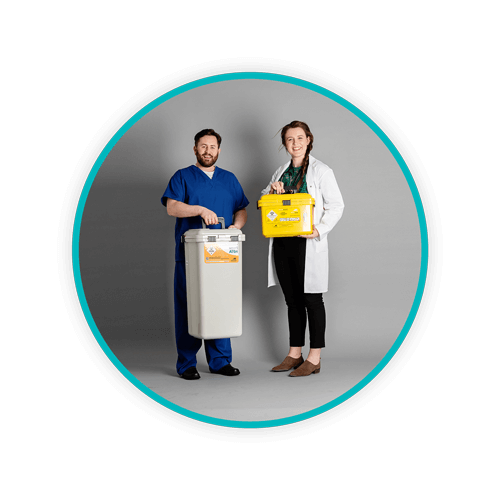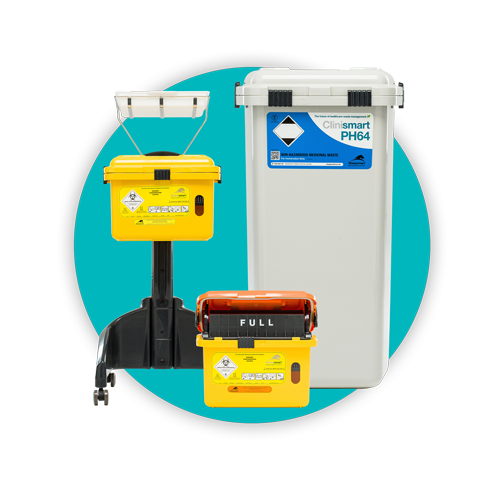What you Need to Know about Medical Waste Audits

Audits. The very word is enough to make you cringe. Picture it: an official inspection. Usually performed by independent auditors that make their way through your facility, examining, scrutinising, evaluating, and analysing your medical waste. The horror. You automatically feel defensive — how dare they?!
Have you been following guidelines for proper clinical waste segregation and management?
Are you being compliant?
You start questioning yourself — oh no, how many errors have you made? Are you confident you know what you’re doing? Will you face the ramifications of non-compliance, of poorly managed hazardous waste disposal, improper removal of pharmaceuticals, or inadequate storage of a waste stream (or numerous waste streams)? Existential crisis sets in as you realise each error results in hefty fines and black marks on your reputation.
Surprisingly, waste audits are not always an inconvenience, especially when performed by your facility on a regular basis. Get ahead of the jump by being prepared. Performing your own waste audits facilitates improved clinical waste segregation, keeping you in compliance, which reduces the risk of fines. Much like studying for a final in college, everything goes much better if you take the time to study and prepare.
First things first. What exactly is the definition of medical waste? Does it imply anatomical waste, cytotoxic waste, and sharps container waste? Or just some of it?
Who defines medical waste?
Every healthcare generator needs to be aware of specific regional guidelines when it comes to biomedical waste management. With Sharpsmart on board, you don’t have to wrack your brain trying to keep it all straight. We know the lingo and the regulations for every region. We got this.
Alright, are you ready for a medical waste audit — like, right now. Nope? Well buckle up, buttercup.
What’s involved in a medical waste audit?
Medical waste audits are executed in any healthcare facility regardless of size — small generator, medium generator, and large generators. All generator sizes are fair game to the auditor:
- Hospitals
- GP’s offices
- Cancer centres
- Walk-in centres
- Veterinary clinics
Any facility that produces medical waste of any kind has the potential to be audited by local, county, or federal government representatives. The primary purpose of a biomedical waste audit is to determine adequacy in separating or segregating medical waste streams. Categories of biomedical waste are typically categoriored as:
- General clinical (or medical) waste
- Biohazardous waste
- Infectious waste
- Radioactive medical waste
In addition to determining proper segregation, a medical waste audit also identifies how much of that waste is recyclable. How much does the facility generate? How much is discarded into landfills?
Waste audits focus on minimising the volume of waste going to landfills, minimising hazards such as sharps injury reduction for healthcare employees and CO2 emissions reduction.
We at Sharpsmart care about sustainability and sincerely hope you do too.
Waste generators are responsible for adequate packaging, storage, containment, and transportation and disposal (through incineration and so forth, or recycling) of clinical waste. Potential to recycle or reuse depends on the waste stream. For this reason, generators of any size should take advantage of medical waste audits to properly identify and segregate biomedical waste from other facility-generated solid wastes at the point of origin. This segregation and auditing also improves safer handling and transportation of such waste not only inside the four walls of the facility, but outside as well.
Incorrect classification causes more waste to go to landfills — take the time to learn your waste streams and get the process right. Don’t be lazy. You’re better than that.
With decades of experience in the field, Sharpsmart understands the importance of auditing and oversight processes that ensure compliance and safety to employees and the environment. clinical waste audits focus on specific behaviors, protocols, and practices within a healthcare facility. When performing waste audits, Sharpsmart also focuses on minimising “touch” aspects, meaning the number of times an individual comes into contact with waste or waste receptacles. We specialise in innovative, reusable, no-touch clinical waste solutions. With our experience, we also know that healthcare facilities want effective, sustainable, labour efficient, and compliant processes for waste segregation and minimisation.
Are you up to date with the latest amendments and regulations that began with the Medical Waste Tracking Act (MWTA), formed in the late 1980s? Today, governments are largely responsible for the regulation of biomedical waste based on these regulations.
Are you following your regional guidelines?
Types of issues addressed in clinical waste audits
Among the most important issues when it comes to clinical waste is how it’s stored, transported, and disposed of. A handful of federal and local governmental agencies provide specific legislative guidelines for the treatment of various types of medical waste. When performing a self-performed medical waste audit, specific issues are addressed:
- Are sharps properly disposed of? Are you following guidelines for safe and effective sharps container placement? Does this placement help ensure sharps injury reduction and reduce the risk of needlestick injury?
- Are cytotoxic, pharmaceutical and clinical waste containers clearly marked or identified for specific waste streams based on colour or adequately sized labelling and do those containers provide the generator’s name and address, and identifications of contents?
Did we make you think? 
The importance of healthcare waste management, segregation, and disposal is not to be ignored. Sharpsmart’s innovations promote safety and sustainability when it comes to healthcare waste solutions for all clinical waste streams. Take advantage of the latest in research, products, and solutions that ensure compliance and optimise your waste streams – saving money and ensuring the safety of your employees and local environment. Our solutions have been developed with clinician feedback in mind and backed by science.
Let's Talk!
Your time is valuable, and we don’t want to play hard to get. You can either phone us directly on the details listed on our contact page, or feel free to fill out this short form and one of our team members will get back to you as quickly as possible.
